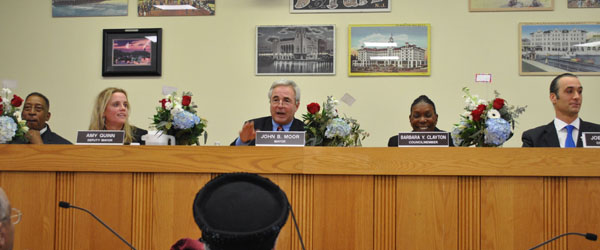Employee contracts call for 8% increase over 5 years
public questions salary ranges
The City Council’s approval of three employment contract agreements during its Wednesday night was met with concern for high salary ranges.
Former city employee Lori Ross questioned how the salary ranges were set and whether an analysis was done to vet against comparable Monmouth County and state employee salary ranges.
“I will tell you that the salary [ranges], seem very high,” she said.
Ross cited a position in the management [AFSCME Union] agreement that began with a minimum $28,000 annual salary but the potential to reach $97,605 in year two and $104,081 by year five.
Moor said the chart provided to the public showed salary ranges and depending on a person’s qualifications they could start off at the low end of the scale.
“Nobody in that position is making $97,000,” Moor said. “Nobody in a majority of those position is making the [maximum].”
The contracts stipulate an 8% increase over five years but reduce the amount of allowable sick days and comp time, and included benefit reductions and additional steps to the employee advancement guides, Mayor John Moor said. For example, an additional 5 steps were added to the non-management [IFPTE Union] guide.
“I think 8 percent in five years is a lot today,” said Eighth Avenue resident Rita Marano said. “People work a lifetime and don’t make $90,000 and these jobs aren’t that hard.”
The agreements were with the AFSCME Union, IFPTE Union – Local 196, and nonunion employees. The police and fire union contracts were settled a year ago, with an overall 10% increase for police and 8% increase for fire, as well as additional steps to their guides, Moor said.
Sick pay was reduced to 15 days per year and department heads were asked to ensure employees do not exceed the terms of each collective bargaining unit with regard to comp time, Acting City Manager Tony Nuccio said.
For example, the manager’s union [AFSCME] will be limited to straight time comp hours as opposed to time and half, Nuccio said. The exception will be for times emergency, like a hurricane or snow storm.
With regard to whether an analysis was done, Councilman Joe Woerner said, when a contract is part of a collective bargaining agreement the question is not that simple.
“There is a history of negotiation that is built upon,” Woerner said. “You can’t just…scratch the contract. You have people that are working up steps. There is past practice, there are existing negotiations, prior negotiations and future negotiations that all have to be taken into account.”
The contracts call for no increase in the first year, a 1.5% increase in years two and three, a 2% increase in year four, and a 3% increase the final year. This equates to a 1.6% average yearly increase, well below the state’s mandate of no more than 2%, Moor said.
———————————-
Follow the Asbury Park Sun on Facebook, Twitter and Instagram.












